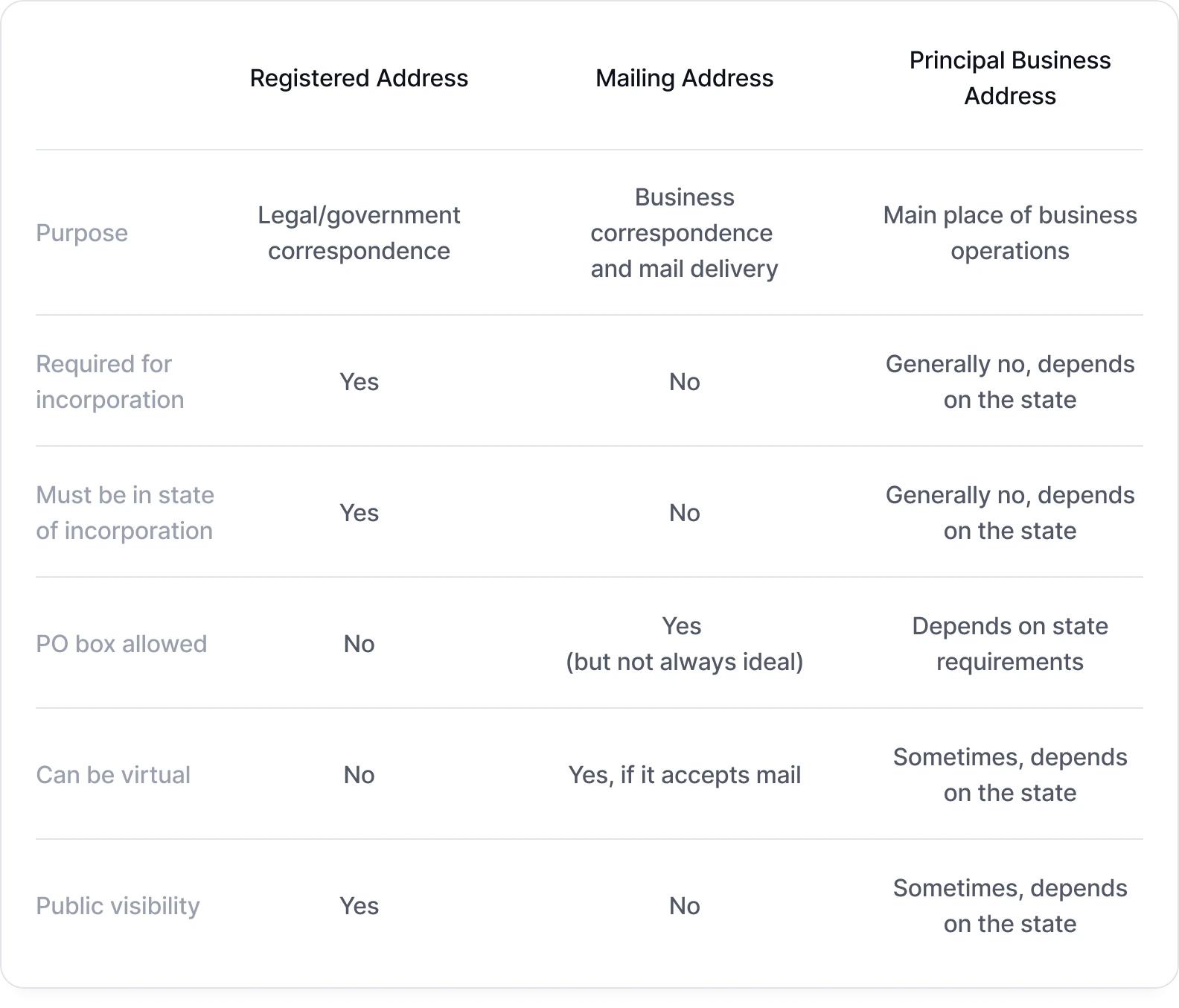
Registered vs. Mailing vs. Principal Business Address: What Founders Need to Know
Many U.S. companies come across different address requirements that may seem confusing at first. One of the most common questions is the difference between a registered address, mailing address, and a principal business address. While they might sound interchangeable, these three addresses serve different purposes. Understanding how they work can help you avoid compliance issues and make the right decisions when setting up or growing your startup.
TL;DR

What Is a Registered Address?
A registered address, which is also called a legal address, is the official location of your company for the government and legal purposes. It’s where:
- The Secretary of State and other government agencies send official correspondence.
- Legal documents, like service of process or subpoenas, are delivered.
- Your company is considered “located” for registration purposes.
This address must be a physical location in the state where your company is incorporated. It can’t be a PO box.
If you’re using a registered agent service, which many startups do, the registered address will usually be that agent’s office. For example, if you incorporate in Delaware through Skala, the registered address will be the address of our registered agent in Delaware.
What Is a Mailing Address?
A mailing address is where your company prefers to receive day-to-day correspondence. This can include tax notices, bank letters, or other business-related communication. The mailing address doesn’t have to be in your state of incorporation. It can be anywhere you want to receive mail, including:
- A virtual mailbox
- Your home office
- A coworking space
Just make sure this address can receive mail reliably, especially if you’re based outside the U.S. Please note, in case your home office address is located in a state other than the state of incorporation, you may be required to file Foreign Qualification with the state of your residence. For more information, see Foreign Qualification: What It Is and Whether Your Business Needs It.
What Is a Principal Business Address?
A principal business address is where your company operates day to day. It’s the address you put on your website, business cards, invoices, or emails. Think of it as your “customer-facing” address. In some states, this is the address that appears in public records.
This can be anywhere your business has a physical or virtual presence. It could be:
- Your actual physical or commercial office
- A home office
- A coworking space
You can have multiple business addresses, especially if your team is distributed across cities or states.
However, certain states require that your business maintain a physical business address within the state, especially when applying for specific business licenses or local permits. For example, states like Florida and Arizona may require a physical presence or location during registration or to qualify for certain activities. Check the requirements of each state where you intend to operate.
When Is Foreign Qualification Not Required?
If your business address is in a different state than your incorporation state, you might think you need to register as a foreign entity. But that’s not always the case. You typically do not need foreign qualification if:
- You don’t have a physical office in that state.
- You don’t hire employees there.
- You don’t directly solicit business or close deals there.
- You don’t own property or lease commercial space there.
Why Do These Addresses Matter?
These three addresses matter because they serve different audiences:
- The registered address is for legal and state compliance.
- The mailing address is for day-to-day communication.
- The principal business address shows where your business operates.
Mixing them up can cause problems. For example, if you list a PO box as your legal address, your company may fall out of good standing with the state. Or if you use your registered agent address as your public-facing business address, you might confuse customers trying to find you.
One more thing to keep in mind is proof of address. Banks often request it to verify that your company has a principal business address and is actively operating in the U.S. Common forms of proof include a utility bill or lease agreement that clearly shows your company’s name and business address. So, if you plan to open a U.S. bank account or work with partners that require verification, choose your business address option carefully.













